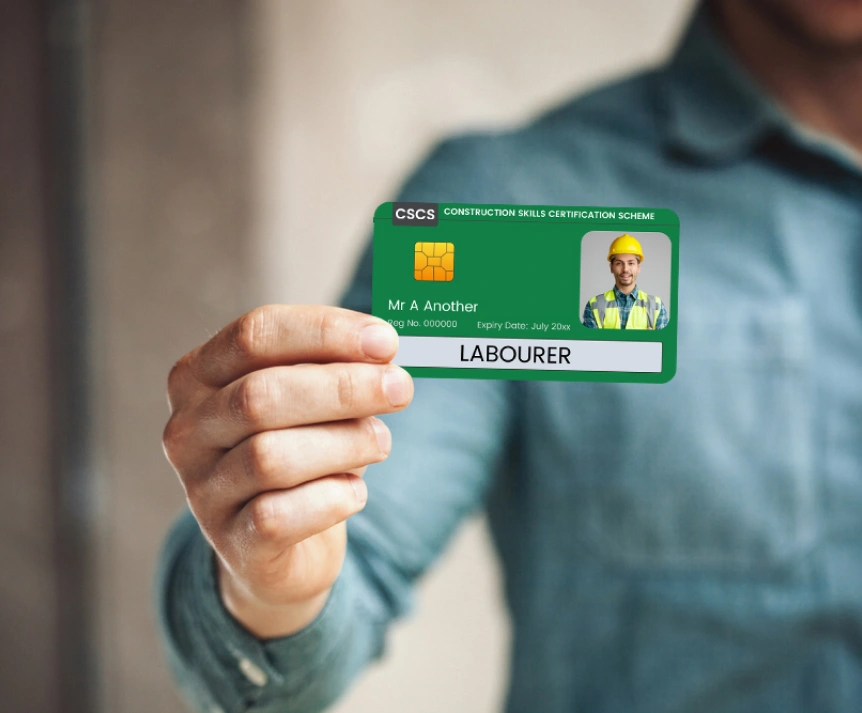The construction industry in the UK will likely require 73,700 plumbers by 2032. To prove that you’re a skilled plumber, you should get a CSCS plumbing card.
In this guide, we’ll talk about which CSCS card you should apply for if you’re a plumber, how much it might cost you, and how to get one.
What CSCS Card Does a Plumber Need?
To get a CSCS card, you have to apply, prove you’re qualified for your job, say plumbing, and then CSCS gives you a card.
As a plumber, you can apply for the Red, Blue, Gold and even Black Card.
The Construction Skills Certification Scheme (CSCS) is an organisation that gives out cards based on your skills. These cards show that you understand how to stay safe while working in construction.
When it comes to plumbing, JIB PMES (Plumbing and Mechanical Engineering Services in England and Wales) acts like the CSCS Partner Card scheme. The process to get these cards is a bit different from other CSCS cards. Also, check out the JIB website to find out which plumbing card specifically goes with your background and experience.
Next up, we’ll talk about which card you should apply for and how to get it.
CSCS Cards for Plumbers
Take a look at the available CSCS card options for those in the plumbing field:
CSCS Red Card
CSCS Red Cards are given to people who are either studying a related qualification or doing an apprenticeship. These cards are a temporary solution until you get a skilled card, as they cannot be renewed once they expire.
If you don’t have an NVQ related to plumbing right now, this card could work for you in the meantime. It lets you work in the field, do your job, and learn while you’re working on your qualification.
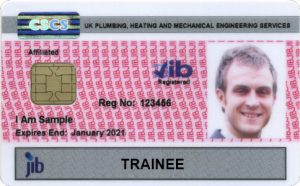
- Validity
The validity of the Red Card ranges from 6 months to 5 years.
CSCS Blue Card
The CSCS Blue Card, sometimes called the Skilled Workers Card, is for those who’re skilled in their field. They work under supervision and follow the plans given by supervisors.
To get a Blue CSCS Card you will need a plumbing-related Level 2 NVQ/SVQ. For additional details, you can also take a look at the JIB website.
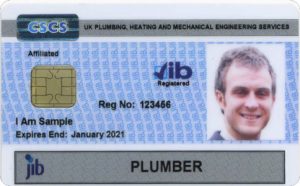
- Validity
A Blue Card remains valid for 5 years. You can renew this card after it expires.
CSCS Gold Card
You can also apply for a CSCS Gold Card if you’re in a supervisory role on a construction site. Before applying for a Gold CSCS Card I would recommend that you use the CSCS card finder to find out if the Gold Card is the right card for you.
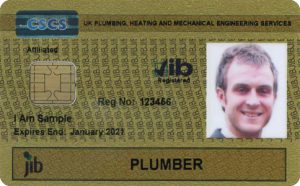
- Validity
The validity of a CSCS Gold Card is 5 years. You can submit the card renewal application once it expires.
CSCS Black Card
The CSCS Black Card is designed for individuals holding higher-level positions in construction management. To get this card, you need to have finished an NVQ/SVQ Level 4 or higher Plumbing Mechanical Engineering Services (PMES) in construction management or a technical subject. You could even start with a Level 4 NVQ in Plumbing and move up to this card.
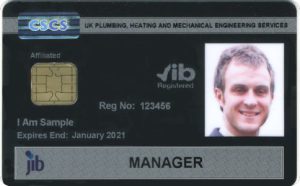
- Validity
The CSCS Black Card stays valid for 5 years. On expiry, it can be renewed.
How to Get a CSCS Card for Plumbing?
1. Enrol on a Relevant Qualification
First, figure out which card matches your job. Earlier, we talked about different plumbing cards. It’s always good to look at what each card requires and see which one fits your skills and experience.
For example, if you have a Level 2 Diploma in Plumbing and Heating, the Blue Plumbing Card would be the most suitable option for you. There are other plumbing cards on this page too. You should see which one you’re eligible for.
2. Pass the Health and Safety Test
This test has multiple-choice questions about safety rules on construction sites. You can book the CITB test through us. It’s smart to do a practice test before the real one.
You’ll find test questions and answers in the video below
3. Apply for the Card
You can apply for the plumbing card online. Upload the documents needed and put in your info.
You’ll find a list of different plumbing cards on this page.
Click on any card and you’ll see the “Apply Online” tab at the top. Click on it to apply for your card.

How Much Does a CSCS Plumbing Card Cost?
The standard card fee for the Blue, Gold and Black Card is £40 and there’s an additional cost of £22.50 for the CITB test. This makes it £62.50 combined.
For the Red Card, the card fee is £20 and the CITB test fee stays the same.
The standard turnaround for your card to arrive is 28 days, or you can pay an additional £100 for the fast-track option and get it in just 4 workdays.
Frequently Asked Questions (FAQs)
Do plumbers need a CSCS card?
CSCS cards aren’t a must for anyone, but having one gives you an advantage over others applying for the same job.
What is a CSCS plumbing card test?
The CSCS test is a multiple-choice test that checks if you know how to stay safe on construction sites. You can get ready for the real test by practising with these mock tests.
Can I upgrade from a CSCS Red plumbing card?
Yes, if you have a red plumbing card, you can level up to other cards like the gold or black ones.
How to apply for the CSCS card as a plumber?
You can apply for the CSCS plumbing card by completing an online application where you will need to share your personal info, select the card type you are applying for, and upload the required documents.
Conclusion
After reading this guide, you should now have a clear understanding of what a CSCS plumbing card is and which one suits your needs best. For additional information, visit the JIB website.
Interested in exploring the different types of CSCS cards? We’ve developed a comprehensive guide that delves into categorising these cards based on their intended recipients and the prerequisites for obtaining each one.


